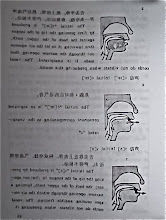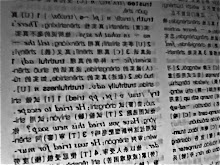I. Photographs Lost
I am still formulating my thoughts on the promised Walter Benjamin installment of "On Direct & Indirect Experience." Rereading Benjamin is both challenging and stimulating; his theories on the effect of mechanical reproduction on the work of art are not as black-and-white as some readers are tempted to make them out to be. Here is a taste of my contributions to come. We the viewers of art now wield in our hands the technology—the digital cameras, the camera phones, even video phones—that can reproduce art. What is the effect on the work of art when we ourselves are the reproducer? What are the new politics and values birthed thusly?
There is much to be said. But, in the meantime, I would like to share the rather unhappy logical extension of my discussion on experience and memory in Scotland.
To review briefly, I carved up my trip to Scotland into two parts. The first comprises so-called direct experiences, which includes time I did not spend behind the lens of a camera and the unmediated memories I can evoke as such. The second comprises so-called indirect experiences, which constitutes time I did spend behind a digital camera and memories I recall through the actual photographs I took.
Now, let's suppose I lost these photographs and their negatives—to a fire, to a flood, during a move, or what have you. What have I, as the photographer, lost? At their best, I conceive of these photographs as portals or triggers: seeing them can transport me back to the site and sight. At their worst, I can conceive of those photographs as archives or time capsules: seeing them can remind me of I place I found worthy of a photograph but that I do not remember experiencing directly. My idea here is, "I know I was at this place, but I have no memory of being at this place."

A vigilant gargoyle perched on pyramidal stones somewhere in Scotland. I do not remember where, but I do remember taking the photograph.
In the first case, if I lose the photographs, I lose a means to return potentially to a direct experience through a document or artifact of indirect experience. In the second case—and this I find haunting—I may forget all knowledge of ever having been at a certain somewhere or having seen a certain something. In a sense, perhaps stronger than I want to admit, it would be as if I never had actually been at X or seen X at all.
What, then, am I left with? I am left with a means without an end. I am left with the memory of taking photographs. I am left with the memory of using technology. A pen without ink and paper with no words on it.

A castle window overlooks a gardened courtyard somewhere in Scotland. I do not remember where, but I do remember taking the photograph.
Before I move on to a more general discussion of memory, here's a short experiment I would like to conduct or that, perchance, has already been conducted. The subject is I) a person who went on a major vacation/trip (parameters need more definition) at least one year ago; and II) the person primarily responsible for photographically documenting that vacation/trip. The experimenter first conducts an interview, asking the subject to recall and describe significant episodes, places, and experiences from the trip. The experimenter next presents the subject with all the photographs the subject captured while on that vacation/trip. A second interview follows. The experimenter thereafter compares the quality and quantity of what the subject remembered during the first, without-photograph interview and the second, with-photograph interview.
II. Memories Lost
These considerations compel me to ask the questions: what is memory and what is it for? Clearly we need to account for evolutionary neurology. Simplistically, in terms of prehistory, memory prevents us from making the same mistake twice: "This fruit made me ill; don't eat it again." Memory aids us in the location and re-location of nutrition and shelter: "Past this ridge is a cave by a watering hole." Memory enables us to learn and apply critical skills: "Strike the flint like so." Memory helps us identify kin or enemy: "I am related to this person; that person is competing with my resources." Memory thus serves the purpose of our navigation through life and our fulfillment of essential needs. We can abundantly adapt these scenarios for modern analogs: skill acquisition, education, professional development, trial and error; object, location, and person identification; and so on. All build towards effective socialization, shelter, provisions, income, general welfare.
But what about non-survivalistic memory? What are my direct and indirect experiences in, say, Scotland for? Or why do I remember so vividly, as I do, a tattered, rain-soaked, dirt-smudged copy of P.D. Eastman's children's classic Are You My Mother? lying in the middle of row-housed street of a once-factory-thriving section of Cincinnati?
And what about the nature of memory itself? Oftentimes we think of memory as a kind of discrete databank. Cached somewhere among the labyrinthine file folders and file pathways are memories, like objects, retrievable with a click of the neurological mouse. It is easy, it is tempting to see the brain as a magnificent supercomputer. But what are the ramifications of our understanding of memory if we view it more phenomenologically? Maybe memory is kind of sedimentation—whether or not we can conjure up a specific image or sensation, whether or not we can conjure up a specific name or word, all of our experiences, direct and indirect, all the lessons and facts we have learned, stick to us, become indelibly embedded into us, absorbed by us, taken in, sometimes transmuted in a way where memory alters truth and thereby becomes the truth, the reality, the actuality.
Lastly, how has memory changed during the digital, information age? When we upload digital photographs onto our computers, is the machine doing the work of memory for us? When a quick Google search—and the inevitable query result of Wikipedia—can tell us how to tie a necktie, provide us a list of all the US state capitals, or break down the events of World War II, is the machine doing the work of memory for us? In some sense, I do think this is the case. Perhaps out of necessity, as I believe the modern person faces an overwhelming amount of and access to "fact." But it seems to me that these memories—personal, historic, collective, utilitarian, emotional—are fundamentally different if the machine does the work. They are preserved in a level of unimaginable detail, yes. Yet, they are, perhaps, no longer ours. They are "outside" of us; we do not carry them within us. It is as if we have surmounted a level of biological necessity, have evolved a kind of post-memory. For we no longer need to remember the specifics if the machine remembers for us. No, we simply need to remember how to use the machine: to transfer memory to the machine, access memory on the machine, navigate its menus, exploit its functionalities. Is this any different than the storage and preservation of memory—knowledge, history in all their forms—in books? I am not sure, but I want to say yes.

Memory is a portal. Someone spray-painted an apt memento mori somewhere in Scotland. I do not remember where, but I remember taking the photograph.
I opened this discussion of memory with the question: "What do I lose if I lose photographs?" I will end with this one: "What would we lose if we lose computers?"



John, lovely written essay, and yet disheartening to hear of the lost memory of experience when the experience was literally enveloping you. Alas, I can prove your hypothesis (though I did upload the photos on my computer). I remember these locations vividly as I was not the one behind the lens. The first two photographs are of Stirling Castle. The second being a great shot from an oillet, I believe it's called. The second is an ominous tunnel leading away from the Tower of London.
ReplyDeletePerhaps, the one sure time you truly experience what you are photographing is while parachuting out of a plane.
I love your blog.
Do you talents end? I thought Dad dropped you a few times when you were a baby!
Love,
Brian